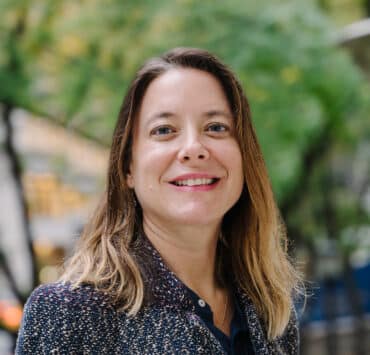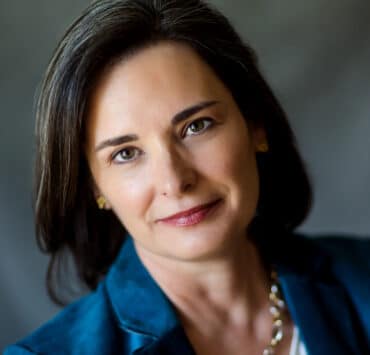|
Getting your Trinity Audio player ready...
|
To those of us who have the pleasure of meeting him, Noah Garcia is an award-winning lawyer, a dedicated mentor, and senior corporate counsel at the Kansas City Southern Railway Company. But Garcia grew up as the target of bullies who picked on him because of his race, and he still has the scars to prove it. With one racist microaggression after another, his classmates bullied him because he was moreno. Privately, they vouched to make his life a living hell while in public, they pretended as if nothing were happening.
“A lot of my peers put me down and made fun of me for being Hispanic. That’s how kids were,” Garcia says. “I don’t have an explanation for it, but they equated not being very smart with being Hispanic.”
Garcia turned to his high school teachers for hope. Despite his subpar grades and lack of ambition, they recognized his potential. Not only did they boost his confidence, but they inspired him to pursue a career in teaching. After Garcia finished high school, he enrolled at Emporia State University (ESU) and majored in education.
“There are good companies out there that have a legitimate interest in developing young, diverse attorneys.”
Noah Garcia
When Garcia arrived on campus at ESU, he excelled in his coursework. The more he breezed through his classes, the more he realized his high school teachers were right. He started to reconsider his career options. And once he changed his major to prelaw, the rest was history. Garcia graduated magna cum laude from ESU in 2009 before earning his JD from the University of Kansas School of Law in 2012.
Garcia was thriving and beginning to put the bullies of the past behind him. However, early into his legal career, he encountered more passive-aggressive racism.
“Early in my professional career, I was asked if I speak English,” Garcia says. “I’ve been told I don’t sound like a Garcia. I get asked all the time if I speak Spanish, but I’m not offended by that question. But then, one time, I got a follow-up question of ‘Can you at least order Mexican food at a restaurant in Spanish?’ My response to that was, ‘I know I am the most qualified professional for this job and none of those qualifications are ordering Mexican food in Spanish.’”
While Garcia was unsure of how to respond back then, he searched for solutions. Even if there wasn’t a cure for bigotry, he refused to remain silent. So, he decided to mentor diverse law school students.
“A lot of the time, just sharing my story will help,” Garcia says. “Or at least in my mentoring and interactions, sharing my story of how I once had an interview start off with somebody saying, ‘Taco, burrito. That’s the only Spanish I know.’” Garcia committed to becoming the mentor he wished he had in law school, and he’s proven to be an invaluable resource.
“For many years, people did not believe in me. They put me down because of my race and ethnicity. Frankly, it was hard to have that belief in myself. And so, once I really believed in myself, things really switched around.”
Noah Garcia
“It’s really letting them know that you can be successful being a minority,” Garcia says. “There are passive DEI strategies, and there are active DEI strategies. If that is important to you, make sure that your core values align with your employer or what you’re going to be doing.”
Meanwhile, Garcia also emphasizes there are law firms and companies that will recruit his mentees for the right reasons.
“There are good companies out there that have a legitimate interest in developing young, diverse attorneys,” Garcia says. “Not just because they want them to be diversity hires or anything like that but because they’re interested in them because they value diversity of thought. They value diversity of opinions, and they really want their counsel to represent their employees, workforce, and the communities they serve and operate in.”
Of course, Garcia knows that fighting for a more diverse legal industry is not enough. He holds himself accountable for fostering equity and inclusion in law firms. Still, he points out that diversity, equity, and inclusion (DEI) is just the beginning.
“I like that it’s DEI: diversity, equity, inclusion. But I saw another company call it diversity, equity, inclusion, and belonging, and I really liked that addition of making people feel like they belong, because a DEI strategy is meaningless if your people do not feel like they belong,” Garcia says.
“One time, I got a follow-up question of ‘Can you at least order Mexican food at a restaurant?’ My response to that was, ‘I know I am the most qualified professional for this job and none of those qualifications are ordering Mexican food in Spanish.’”
Noah Garcia
For his collaborators in and beyond the organization, Garcia’s passion and dedication to building a respectful and empowering work culture is evident. “I enjoy working with Noah because he listens carefully, questions wisely, and makes clear and concise decisions that provide sound guidance in complex matters,” says J. Mitchell Smith, principal at Germer PLLC. “He sets clear goals and outlines simple paths upon which one can reach those goals. Complicated and stressful litigation does not rattle him in the least. He remains calm and in charge. Noah is the epitome of strong, effective leadership.’’
Beyond what Garcia accomplishes as an advocate, he carves out time to lend his legal expertise outside of the Kansas City Southern Railway Company.
Garcia is a member of the ABA Military Pro Bono Project and Operation Standby, a national network of attorneys that provides pro bono civil legal services to junior-enlisted service members (and their families) stationed worldwide. In his casework with the network, Garcia helped create a law in the state of Kansas that gives active-duty service members additional protections from being served a lawsuit at their place of residence rather than where they are stationed.
In September 2022, Garcia received an In-House Counsel Award from Missouri Lawyers Media (MLM). It should fit right in next to the MLM Diversity & Inclusion Award and theSuper Lawyers Rising Stars plaques in his collection. Yet those will never compare to his greatest accomplishment.
“For many years, people did not believe in me. They put me down because of my race and ethnicity. Frankly, it was hard to have that belief in myself. And so, once I really believed in myself, things really switched around.”

